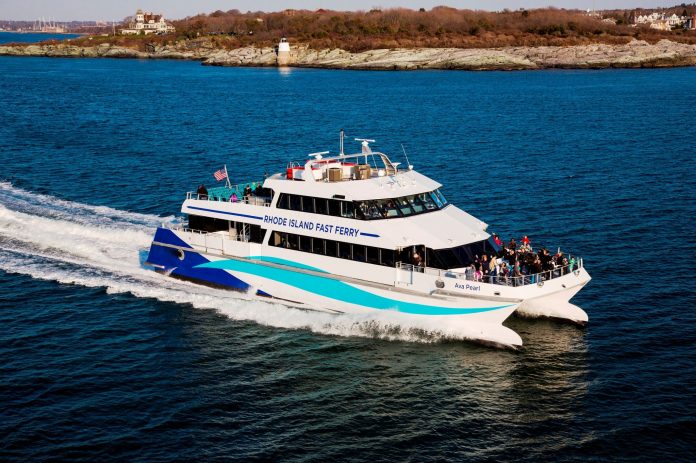
PROVIDENCE — Rhode Island Fast Ferry argues it does have a “realistic expectation” to obtain a docking facility in Old Harbor on Block Island for seasonal fast-ferry service from Quonset Point in North Kingstown to the island, while the town of New Shoreham argues the contrary, according to the post-hearing memoranda both respective parties filed May 21 with the R.I. Division of Public Utilities and Carriers.
The two sides also filed rebuttals June 4 disputing each others’ claims in their respective memoranda.
The filings come after the remand hearings were held at the DPUC’s offices in Warwick on March 30 and April 4. They were the latest in the lengthy dispute between Rhode Island Fast Ferry – owned by Charles A. Donadio Jr. – New Shoreham and Interstate Navigation Co., which operates Block Island Ferry in Narragansett, Newport and Fall River, and held more than a year after Donadio’s application for an operations license was approved by the DPUC in September 2016.
Both Interstate and New Shoreham are jointly appealing the ruling in R.I. Superior Court, and the court ordered for the new hearings because New Shoreham successfully argued that the hearing in which hearing officer John Spirito ruled on in June 2017 that the DPUC would not revisit the docking matter due to “insufficient justification” was not recorded.
Attorney James A. Hall, part of Rhode Island Fast Ferry’s legal team which includes attorneys Alan M. Shoer and Nicole M. Verdi of Providence-based firm Adler Pollock & Sheehan PC, states in his memoranda that Bluewater LLC has the ability to restructure the former Mount Hope Dock – decommissioned in the 1930s – for the ferry service because the U.S. Army Corps of Engineers has jurisdiction over the property, not New Shoreham, and the viability of the proposal will be “determined through the ongoing ACOE process.”
He also argues the rights of entry agreement regarding the island’s East Breakwater area – one of the two areas Bluewater proposes to build docking – between the federal government and New Shoreham, which disallows any entity to impede the town and its public access, expired more than a year ago and “has not been extended by the ACOE,” based on testimony from town officials during the hearings. Therefore, Hall argues, any restrictions imposed by the agreement are “no longer valid” and the town relying on such agreement “constitutes more than speculation as to some future ROE period.”
New Shoreham solicitor Katherine Merolla argued in her respective memoranda the ROE agreement does not expire until Sept. 16, 2021. Merolla also argues that former New Shoreham Town Manager Nancy Dodge, in her testimony, requested to include language in the agreement stating the government would not allow any entity to construct structures that would impede public access to the town’s bait dock, to the East Breakwater and to the adjacent beach, and “the federal government agreed.”
Dodge also testified, according to Merolla’s memoranda, that the town’s consent “is required” to build the proposed docks in East Breakwater because it “would impede or restrict” public access to the area. Hall refutes this claim, stating New Shoreham has “failed” to provide evidence supporting the claim the docking would impede on the area, including preventing the town from maintain the breakwater – a point that was repeated in Rhode Island Fast Ferry’s rebuttal, filed by Verdi.
Hall also argues New Shoreham has not offered evidence that Bluewater’s proposals before the ACOE and the R.I. Coastal Resource Management Council have been derailed. Hall says the ACOE permitting process is a “multi-step” process and while the review may be taking “longer than expected,” it’s still moving forward and delays in the process “does not equate to derailment.”
Merolla, in her rebuttal, states Bluewater’s applications have been derailed, arguing Bluewater “could not get by the preliminary determination stage” with CRMC. She cited the deficiency notice CRMC issued Bluewater on March 28, where Filippi was told in writing he didn’t provide “necessary proof of ownership” for the work in the area, nor the “necessary consent” from both the town and federal government.
Hall argues CRMC didn’t request a sign-off by New Shoreham’s building official as that item wasn’t checked off on the deficiency notice. Hall also argues the information, based on position under the second heading of the notice, is “not required” for CRMC to start reviewing Bluewater’s application. He cites CRMC states in the notice that not supplying its requested information “will not prevent [the] application from being accepted by the CRMC,” further arguing this is not a formal denial by CRMC.
“Until Bluewater is afforded a hearing and final CRMC Council decision… any notice prepared by staff does not by itself constitute a CRMC denial,” Hall wrote.
Merolla describes the argument of the box not being checked as “nonsensical” in her rebuttal, stating the CRMC’s preliminary determination does not require a letter from the building official, the application for state consent to build the dock “absolutely does.”
DPUC spokesman Thomas Kogut said Thursday that Spirito is currently working on the written order as to whether or not grant New Shoreham’s request to have the docking matter be fully remanded back to the DPUC or have the case be returned to Superior Court. The ruling is expected to be issued later this summer, Kogut said.
James Bessette is a PBN staff writer. Email him at Research@PBN.com.












